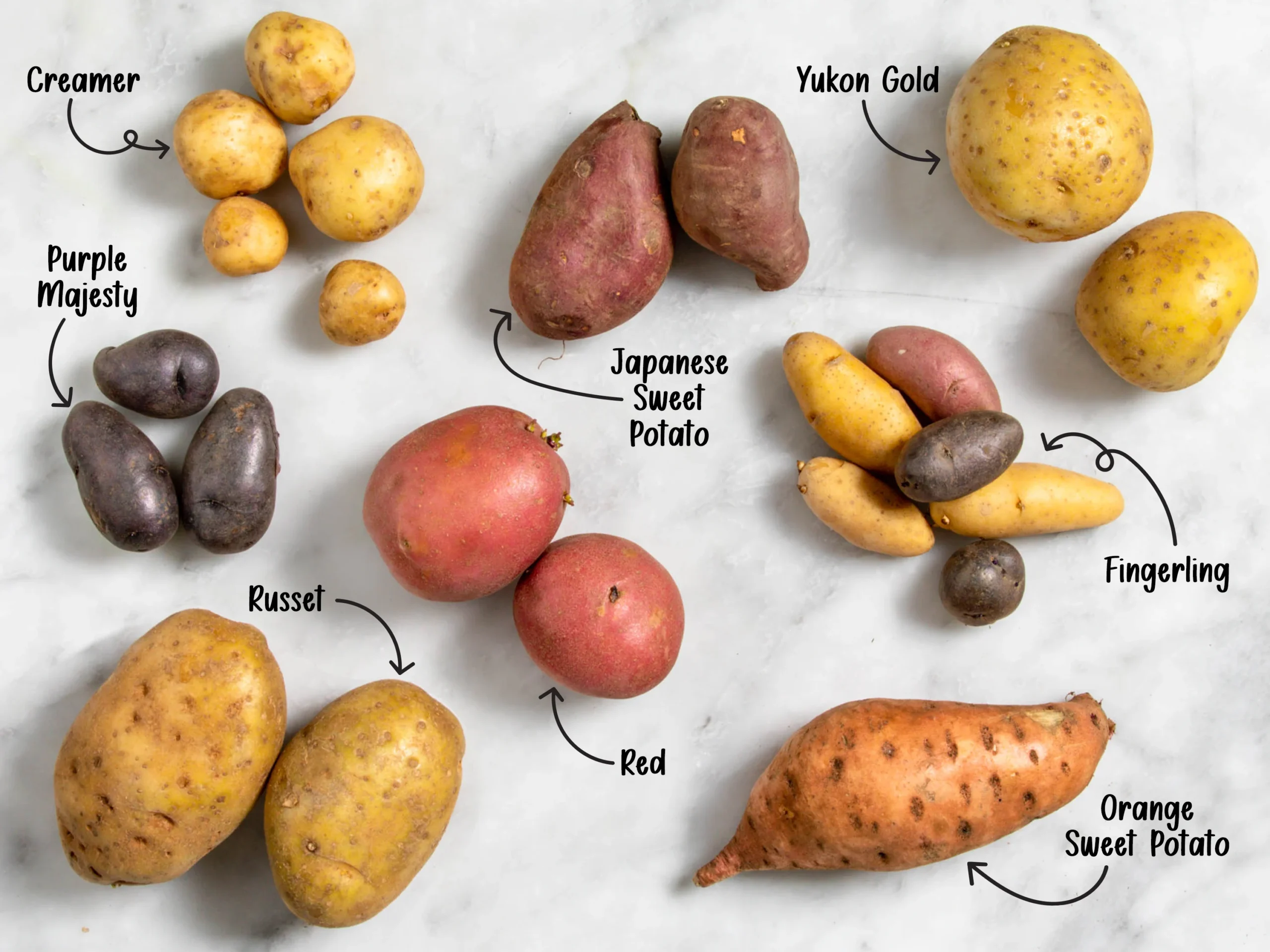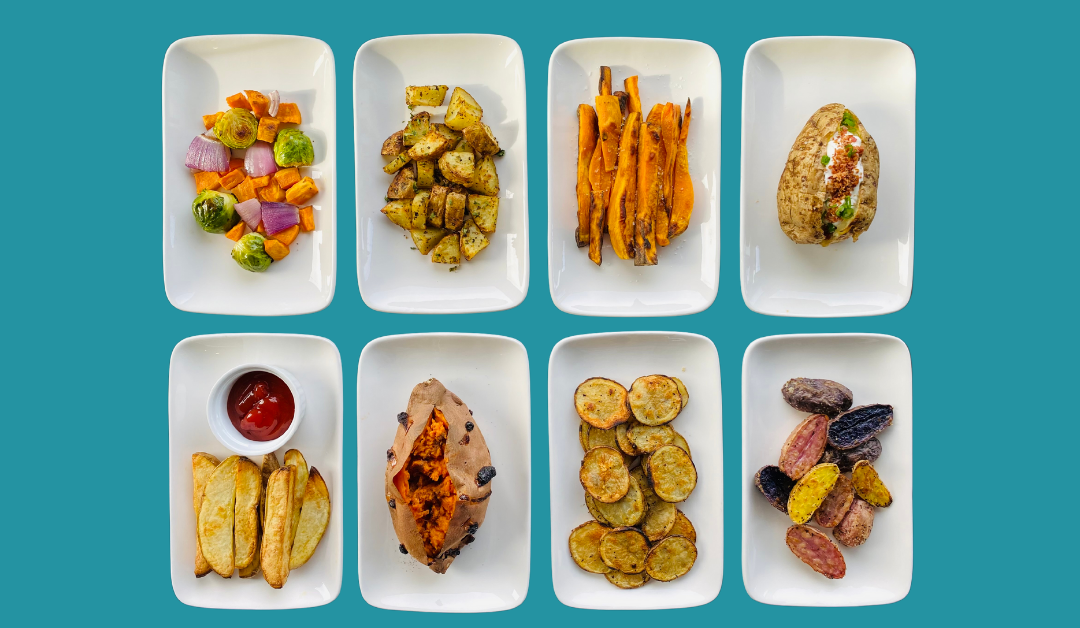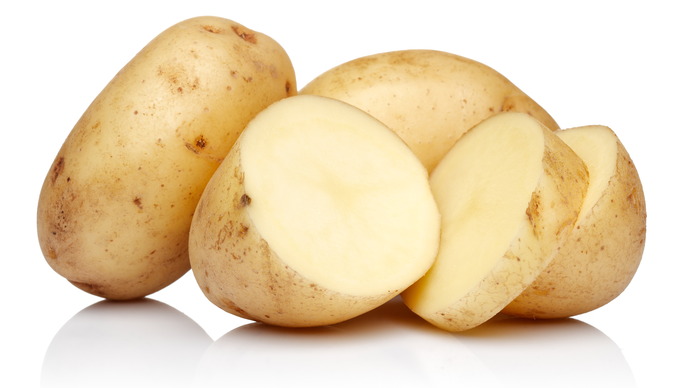Do you think potatoes are just fattening or unhealthy?
Many people avoid potatoes because they believe they cause weight gain or have no health value.
But that’s not the full truth.
Potatoes are actually packed with important nutrients that can support your body in many ways.
When eaten the right way and in the right amount, potatoes can give your body energy, boost your immunity, improve digestion, and even help manage blood pressure.
In this article, you’ll discover the top 10 health benefits of potatoes and why this humble root vegetable deserves a place in your healthy diet.

Nutritional Overview of Potatoes
Potatoes aren’t just comfort food—they’re loaded with essential nutrients.
A single medium-sized potato (about 150 grams) provides:
- Vitamin C: Supports immune function and helps the body fight infections.
- Vitamin B6: Crucial for brain development and healthy nervous system function.
- Potassium: Helps regulate blood pressure by balancing sodium levels.
- Dietary Fiber: Promotes digestion and reduces constipation.
Potatoes also contain magnesium, iron, and antioxidants, such as polyphenols and carotenoids.
They are naturally fat-free and contain complex carbohydrates, which give the body sustained energy.
However, how potatoes are prepared affects their nutritional value.
For example, baking or boiling preserves more nutrients compared to frying, which adds unnecessary fats and calories.
The Top 10 Health Benefits of Potatoes
Potatoes are often underestimated in terms of their nutritional value and health benefits.
Rich in essential nutrients, they can play a significant role in a balanced diet.
Here’s an expanded look at the top ten health benefits of potatoes, highlighting their importance for overall health and wellness.
1. Boosts Digestive Health
Potatoes are a great source of fiber and resistant starch, both of which are crucial for maintaining digestive health.
Fiber is essential for promoting regular bowel movements and preventing constipation.
Resistant starch, a type of fiber that is not fully digested in the small intestine, serves as food for beneficial bacteria in your gut, promoting a healthy microbiome.
This fermentation process produces short-chain fatty acids, which nourish the cells of the colon and support gut health.
Moreover, the fiber content helps bulk up stool, making bowel movements regular and smooth, thereby reducing the risk of digestive disorders such as diverticulitis and hemorrhoids.
Incorporating potatoes into your diet can thus help maintain a healthy gut environment, improve digestion, and enhance nutrient absorption.
2. Improves Heart Health
Potatoes are rich in potassium, a mineral essential for heart health.
Potassium helps lower blood pressure by counteracting the effects of sodium, which is crucial for reducing the risk of cardiovascular disease.
Research has shown that diets high in potassium are associated with improved heart function and a lower likelihood of strokes.
Additionally, potassium helps regulate heart rhythms and can reduce the risk of arrhythmias.
The fiber found in potatoes also contributes to heart health by helping to manage cholesterol levels; soluble fiber can bind to cholesterol in the digestive system, preventing its absorption into the bloodstream.
3. Supports Weight Loss
The fiber content in potatoes makes them very filling, helping you stay satisfied longer and curb unnecessary snacking.
This satiety factor is particularly beneficial for those looking to manage their weight or reduce caloric intake without feeling deprived.
Research suggests that foods rich in resistant starch can enhance fat metabolism by increasing energy expenditure after meals.
When prepared healthily—such as baked or boiled—potatoes can be part of a balanced weight-loss diet without adding excessive calories or unhealthy fats.
Moreover, their versatility allows for various healthy preparations, making it easier to integrate them into your daily meals while still enjoying delicious flavors.
4. Regulates Blood Sugar
Potatoes contain resistant starch, which slows down digestion and helps maintain stable blood sugar levels.
This makes them an excellent choice for individuals who want to control glucose spikes after meals—especially important for those with insulin sensitivity or type 2 diabetes.
However, it’s important to note that how you prepare potatoes matters; boiled or baked versions have a lower glycemic index than fried ones, which can cause rapid blood sugar increases.
Pairing potatoes with protein or healthy fats can further slow digestion and prevent blood sugar spikes.
5. Enhances Immune Function
Vitamin C is not just found in citrus fruits—potatoes also contain a good amount of this essential vitamin!
Vitamin C is a powerful antioxidant that strengthens the immune system by promoting the production of white blood cells and enhancing their function.
This vitamin helps the body fight infections more effectively and supports faster wound healing by aiding collagen synthesis—a vital protein for skin integrity and repair.
Additionally, potatoes contain other antioxidants such as flavonoids and carotenoids that further bolster immune defenses against oxidative stress and inflammation.
Adding potatoes to your diet can be an easy way to boost your daily Vitamin C intake while supporting overall immune function.
6. Promotes Skin Health
The antioxidants found in potatoes, such as carotenoids and polyphenols, can help protect the skin from damage caused by free radicals—unstable molecules that contribute to aging and skin conditions.
Applying raw potato slices on the skin is a popular natural remedy for reducing puffiness around the eyes and alleviating dark circles due to their cooling effect and anti-inflammatory properties.
Moreover, regular consumption of potatoes may improve skin elasticity and hydration due to their nutrient content—including vitamins B6 and C—which are essential for maintaining healthy skin.
7. Improves Mental Health
Potatoes are a good source of Vitamin B6, which is essential for brain function and mental health.
Vitamin B6 plays a critical role in producing neurotransmitters such as serotonin and dopamine—chemicals that regulate mood, emotions, and cognitive function.
A deficiency in Vitamin B6 has been linked to depression, anxiety, and mental fatigue; therefore, consuming potatoes can contribute positively to mental well-being by ensuring adequate levels of this vital nutrient.
Additionally, the carbohydrates found in potatoes provide a steady source of energy for the brain, supporting concentration and cognitive performance throughout the day.
8. Helps Sleep Quality
Potatoes are naturally high in potassium, which helps relax muscles and supports healthy sleep patterns by regulating nerve function.
Consuming potassium-rich foods like potatoes may promote better sleep by helping to relax muscles before bedtime and improving overall relaxation during sleep cycles.
Furthermore, the carbohydrates present in potatoes can increase the availability of tryptophan—a precursor to serotonin—which plays a role in regulating sleep quality.
9. Reduces Inflammation
Packed with antioxidants such as flavonoids and carotenoids, potatoes combat chronic inflammation within the body—an underlying factor in many chronic diseases.
This makes them beneficial for individuals dealing with inflammatory conditions such as arthritis or other chronic pain issues.
The anti-inflammatory properties of these antioxidants help reduce oxidative stress and protect tissues from damage caused by inflammation.
10. Prevents Kidney Stones
Potatoes are rich in potassium—a mineral that plays a crucial role in maintaining mineral balance within the body—and help reduce calcium accumulation in the kidneys.
This makes potatoes a smart choice for anyone prone to kidney problems or looking to support kidney health through dietary choices.
Additionally, staying well-hydrated while consuming potassium-rich foods like potatoes further supports kidney function by promoting urine production and flushing out toxins.
Healthy Ways to Prepare Potatoes
The way you prepare potatoes can significantly impact their nutritional value and overall health benefits.
When cooked thoughtfully, potatoes can be a delicious and nutritious addition to your meals.
Here are some healthy methods to enjoy this versatile vegetable while maximizing its health benefits:
1. Baked or Roasted Potatoes
Baking or roasting potatoes is one of the healthiest preparation methods, as it retains most of its nutrients while adding a delightful crispness.
To prepare baked or roasted potatoes, preheat your oven to 425°F (220°C).
Wash the potatoes thoroughly and prick them with a fork to allow steam to escape during cooking.
You can lightly coat them with a small amount of heart-healthy olive oil and season with herbs and spices for added flavor without excessive calories.
Roasting potatoes at high heat enhances their natural sweetness and creates a satisfying texture.
Consider adding vegetables like bell peppers, onions, or garlic to the roasting pan for an extra nutrient boost and added flavor.

2. Boiled Potatoes
Boiling is another healthy method for preparing potatoes, especially when done correctly.
To preserve more nutrients, boil potatoes with the skin on, as many vitamins and minerals are concentrated in the skin.
Cut the potatoes into uniform pieces to ensure even cooking, and avoid overcooking them to minimize nutrient loss.
After boiling, drain the potatoes and serve them warm with a sprinkle of herbs or a drizzle of olive oil for flavor.
Boiled potatoes can also be mixed into salads or served as a side dish, making them a versatile addition to your meals.
3. Mashed Potatoes
Mashed potatoes can be made healthier by using low-fat milk or buttermilk instead of heavy cream.
To prepare mashed potatoes, start by boiling peeled or unpeeled potatoes until tender.
Once cooked, mash them using a potato masher or ricer for a creamy texture.
Include low-fat milk gradually until you reach your desired consistency.
You can also add flavor by mixing in roasted garlic, fresh herbs like chives or parsley, or even sautéed vegetables such as spinach or kale for added nutrition.
Avoid excessive butter to keep the dish light while still enjoying that comforting taste.
4. Oven-Baked Fries
Swap traditional deep-fried fries for oven-baked ones to reduce fat content without sacrificing flavor.
To make oven-baked fries, cut potatoes into thin strips and toss them in a bowl with olive oil, salt, and your favorite seasonings—such as paprika, garlic powder, or rosemary.
Spread the seasoned potato strips in a single layer on a baking sheet lined with parchment paper to prevent sticking.
Bake at 425°F (220°C) for about 30-40 minutes, flipping halfway through until they are golden brown and crispy.
This method allows you to enjoy fries with significantly less fat than their fried counterparts while still satisfying your cravings.
5. Potato Salad
A healthy potato salad can be made by boiling new potatoes until tender and then tossing them with fresh herbs, diced vegetables, and a light vinaigrette dressing instead of heavy mayonnaise.
Consider using Greek yogurt as a creamy base for added protein without the extra calories from traditional dressings.
Mix in ingredients like chopped celery, red onion, bell peppers, or even pickles for extra crunch and flavor.
This refreshing side dish is perfect for picnics or barbecues and provides a nutritious option that everyone will enjoy.
Potential Side Effects of Eating Potatoes
Here are some important considerations to keep in mind regarding the consumption of potatoes:
1. High Glycemic Index
Certain types of potatoes can have a high glycemic index (GI), which means they can cause rapid spikes in blood sugar levels.
This is particularly concerning for individuals with diabetes or those trying to manage their blood sugar levels.
Boiled and baked potatoes typically have a lower glycemic index compared to fried varieties, making them a better choice for maintaining stable glucose levels.
Choosing varieties like sweet potatoes or new potatoes can also help, as they generally have a lower GI than starchy white potatoes.
To minimize blood sugar spikes, it’s advisable to pair potatoes with protein or healthy fats, which can slow down digestion and promote better glucose control.
2. Weight Gain Risk
Potatoes are calorie-dense, especially when prepared in unhealthy ways—such as frying or smothering in heavy toppings like butter, sour cream, or cheese.
These preparation methods can significantly increase the caloric content of potatoes, leading to potential weight gain if consumed excessively.
To prevent weight gain, focus on healthier preparation methods such as baking, boiling, or steaming.
Adding potatoes to a balanced diet that includes plenty of vegetables, lean proteins, and healthy fats can help you enjoy their benefits without the risk of excess calories.
3. Acrylamide Formation
One of the more concerning aspects of potato preparation is the formation of acrylamide—a chemical that can form when starchy foods are cooked at high temperatures, such as frying or baking at elevated temperatures.
Acrylamide has been linked to cancer risk in laboratory studies, although the levels found in food are much lower than those used in animal studies that showed harmful effects.
When potatoes are fried or baked at high temperatures, they can produce acrylamide due to the Maillard reaction—a chemical reaction between amino acids and reducing sugars that gives browned foods their distinctive flavor and color.
To reduce exposure to acrylamide, consider the following strategies:
Soaking Potatoes: Soaking raw potato slices in water for 15–30 minutes before frying or roasting can help reduce acrylamide formation by removing some of the sugars and amino acids that contribute to its production.
Cooking Methods: Choose cooking methods that produce less acrylamide. Boiling and microwaving whole potatoes with the skin on create little to no acrylamide compared to frying or baking at high temperatures.
Cooking Temperature and Time: Cook potatoes until they are golden yellow rather than dark brown. The darker the color, the higher the acrylamide content tends to be.




